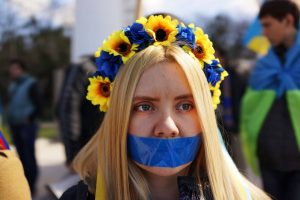Zoé Tkaczyk
Impunity Watch News Guest Writer
THE HAGUE, Netherlands – On January 31, 2024, the International Court of Justice (ICJ) delivered a landmark judgment in the Ukraine v. Russia case concerning the International Convention on the Elimination of All Forms of Racial Discrimination (CERD).
 |
While the Court dismissed most of the allegations presented by Ukraine, it did investigate claims concerning the suppression of Ukrainian language and culture in Crimea. The Court’s ruling that Russia violated certain obligations under the CERD–regarding the educational rights of the Ukrainian-speaking community in Crimea–while limited, was still significant in demonstrating the importance of protecting minority rights and cultural identity.
The Court began by recalling that the current proceedings were instituted by Ukraine after events in Eastern Ukraine and Crimea in early 2014. With the parties currently engaged in an armed conflict, the Court had limited the scope of its opinion under this treaty significantly, clarifying that it was not ruling on issues beyond the CERD claims. Evidence submitted by Ukraine spans as far back as 2014, after the annexation of Crimea by the Russian Federation. Specifically, Ukraine alleges that Russia is engaged in a campaign of racial Discrimination against Crimean Tatars and ethnic Ukrainians in Crimea by depriving them of their political, civil, economic, social, and cultural rights.
Ukraine instituted the case in 2017 to address events that occurred in 2014 in Eastern Ukraine and the Crimean peninsula. Claims under CERD included allegations of systematic discrimination against Crimean Tatars and ethnic Ukrainian communities in Crimea. Ukraine also asked for reparations for all victims of the erasure and discrimination. The Court ruled on eight specific CERD claims, but ultimately only found Russia in violation of one. The Cout found that Russia violated Articles 2(1)(a) and 5(e)(v) of the CERD because of the educational system it instituted in Crimea after 2014. The Court rejected all of Ukraine’s other claims under CERD.
These included claims of alleged physical violence directed toward these groups because of their political and ideological positions, racially motivated behavior by law enforcement toward members of these groups, and restrictions on media, cultural gatherings, heritage, and education. The one claim the Court found Russia in violation of related to protecting educational opportunities in Ukrainian. Specifically, the court found violations of Articles 2 and 5. It further explained that while declining to offer education in a minority language was not racial discrimination under CERD, the structural changes Russia implemented in schools to change the language of instruction made it unreasonably difficult for children to receive education in their primary language. The Court also found evidence of harassment against individuals choosing to pursue their education in Ukrainian. Thus, it found Russia in violation of these articles.
Since the reorientation of the Crimean education system to Russian, Ukrainian language instruction has fallen by 90%. Despite this, the Court did not find that Russia’s violation of the CERD articles was the sole cause of the decline, and left many hopeful human rights advocates disappointed by the outcome of the case. The ruling came during a myriad of other ICJ rulings based on Russia’s actions in Ukraine and raised questions about the retroactivity of these holdings and evidentiary questions when acts overlap under various human rights treaties. The Court did not provide legal guidance for many of the questions that these cases are raising.
Note: This case was decided in tandem with a ruling on the International Convention for the Suppression of the Financing of Terrorism (ICSFT). This article is one of a seven-part series exploring the Russo-Ukrainian War. Zoé Tkaczyk is a J.D./MAIR candidate (May 2025) at the Syracuse University College of Law and Maxwell School of Citizenship and Public Affairs. This article series was inspired by sessions from the Carnegie-Maxwell Policy Planning Lab Fellowship: Postwar: Europe, Ukraine and the Future of European Order. Special thanks to Cora True-Frost and Alexa Connaughton for their guidance, feedback, and edits.